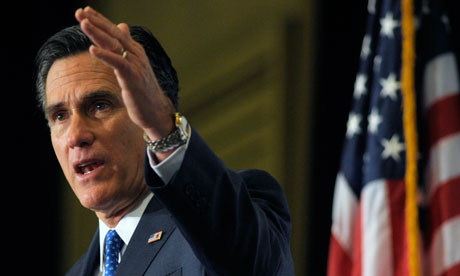US Republicans: divided they stand:
If any reminder were needed of how conflicted the US Republican party is about its choice of 2012 presidential candidate, party members in three states have provided it this week. In one sense, Rick Santorum's wins in Minnesota, Missouri and Colorado are not as important as they may appear since, under the arcane and varied rules of the nomination process, they give him no pledged delegates to the August party convention. Coming after his poor showing in every one of the primaries and caucuses since his narrow win in Iowa at the start of January, however, they breathe new life into Mr Santorum's ailing campaign and pose unwelcome problems to Mitt Romney and Newt Gingrich, who hoped they had emerged from the January contests as front runner and chief challenger respectively.
For Mr Romney, this week's defeats are a clear warning that he has not yet achieved the irresistible momentum towards the nomination that his well-funded wins in New Hampshire, Florida and Nevada might have led him to hope. Mr Romney did not campaign hard in this week's three contests, preferring to concentrate his awesome financial backing instates which vote at the end of February and in the early March "Super Tuesday" contests, when serious numbers of pledged delegates are up for grabs. But this only underscores Mr Romney's continuing weaknessas a candidate relying on money and momentum rather than political conviction and credibility. He is still the man to beat, but his capture of the nomination, if it eventually occurs, has an increasingly pyrrhic feel, since the longer the contests go on, the clearer it becomes that mostRepublicans do not really support him.
The consolation for Mr Romney is that the many Republicans who want a candidate who more clearly shares their conservative values and prejudices are unable to make up their minds which one to support. Mr Gingrich trades as the arch-conservative option, but his record and personality are so contradictory that he is having an uphill task translating his successes into wider credibility. It says a lot about his flawed candidacy that he has been unable both to prevent Mr Santorum, a dull and deeply social conservative rival, from resurrecting his campaign this week, or to take chunks out of Mr Romney's support either.
The undoubted winner this week, therefore, is Barack Obama, who watches as his opponents expend sound, fury and dollars denouncing one another while voters gradually move back in his direction. Mr Obama is not an inevitable winner in November – as the voters in 2010 showed. But the Republicans' failure to unite behind a credible candidate or platform is improving Mr Obama's chances by the day – and there are many more days of Republican division still to go in this race.
Source: http://www.guardian.co.uk/commentisfree/2012/feb/09/us-republican-nomination-barack-obama
Conservatives see tough challenges on road to White House:
Washington (CNN) -- Republicans looking to take back the White House in November face a challenging political environment, a trio of conservative political observers said Thursday at an annual gathering of conservative activists.
The recent controversy over health insurance coverage for contraception may help to turn out Catholic swing voters in key states, but the observers also said the Republican Party would do well to have its own positive agenda and clear messaging if it wants to unseat President Barack Obama.
"None of the signs that I see are particularly good," said Ralph Z. Hallow, chief political writer for The Washington Times.
Hallow added that polling he has seen indicates that intensity or enthusiasm about voting has moved from Republicans to Democrats. "I regard that as a very bad sign," he said.
The newspaperman continued, "The enthusiasm among Republican voters for any of the (GOP presidential) candidates is dangerously low so that ... none of these folks generates the enthusiasm needed in November to bring more Republican-voting independents and Republican activists and so on to the polls."
Conservative blogger Erick Erickson, who is also a CNN contributor, said the situation stems partly from the state of the Republican Party after the last GOP president left the White House.
"I actually blame (George W.) Bush for this," Erickson said to a packed ballroom. "Every president generally has an heir apparent when they leave office."
Vice President Dick Cheney did not succeed Bush as the GOP's presumptive standard bearer in 2008, preventing the party from having a "referendum" on Bush's legacy by either choosing Cheney or someone else as the nominee, Erickson said.
"Because (Bush and Cheney) left a void there, we went all the way back to 2000 and started over again -- a lot of us having the same fights we've had. And we're now in the situation where all the (GOP presidential) candidates, including (Mitt) Romney to a degree, are a bit of a victim of this void that was left by not having an heir," he said.
"I think the Republican Party has yet to reset itself from the Bush years to be able to move forward."
Ralph Reed, founder and chairman of the Faith and Freedom Coalition, appeared less pessimistic than Hallow and Erickson. Reed said he believes that what is shaping up to be a long Republican primary process may work to the GOP's benefit in the general election against Obama.
Reed described the 2012 GOP nomination race as "the most wide open, the most fluid, the most topsy-turvy" presidential primary he has seen since first becoming involved in presidential campaigns in 1980.
"Whoever emerges from this process -- whether it's Romney or somebody else -- is going to be a better, a more-disciplined, a tougher candidate when they have to stand on a stage with Barack Obama," Reed said.
Reed pointed to the controversy over a pending Obama administration regulation that requires religiously affiliated institutions to provide health insurance coverage for contraception to its employees as one issue that could help fill the enthusiasm gap the GOP is facing with its conservative base.
Reed said the regulation, which the White House has hinted it is looking to soften after an outcry from Catholic bishops, "shows not just an insensitivity to but an outright hostility by this president to religion and religious values."
And, Reed said, the controversy could make the difference with Catholic swing voters in key battleground states, including Ohio, Michigan, Indiana, Pennsylvania and Florida.
But Reed and Erickson both opined that to maximize their chances of retaking the White House in November Republicans should have a positive agenda and not settle just for attacking the president's record and policies on the economy and other issues.
"It isn't going to be enough to just be anti-Obama," Reed said. "Whether it's Romney or (Rick) Santorum or (Newt) Gingrich, we have to have a forward-leaning, positive, conservative reform agenda that will excite and energize the grass roots."
With recent indicators suggesting the struggling economy may be improving, the GOP has a particular challenge in November. While unemployment is improving according to recent data, Reed said other economic factors could be in play for voters.
"It's not just the single unemployment number; it's whether people feel like they've got money in their pocket," Reed said.
Erickson said he sees the economy alone as a losing strategy.
"I think the race should be about more than the economy," the blogger said. "Unfortunately, I think the Republicans have decided that they're going to go with electability instead of issues. And if electability is your case and the electability is based on (fixing the economy) and the economy fixes itself, then why do we necessarily need a nominee who the Obama campaign is going to spend millions and millions of dollars on to make unlikable?
"There needs to be something more to it. (Reed) is right. We have to have more of an agenda."
Erickson added that he thought Republicans had "dropped the ball on telling the story of Barack Obama. They never have. They always thought that they could use the economy (against Obama)."
"He picks the winners and losers," Erickson said of Obama, "not the free market. And there's a story to be told there, I think, that resonates with people in the country."
By focusing so much on the economy, Erickson said he fears the GOP is setting itself up for defeat in November. "I hate to be so pessimistic about an election we should win, but it seems like we are setting ourselves up to lose if the economy improves," Erickson said.
Hallow added that he thought the Republican presidential candidates have yet to crystallize clear, concise messages in support of their Oval Office bids.
"Unless the nominee has a message -- a simple message that you can get out in three sentences -- I don't think we have a chance or Republicans have a chance," Hallow said.
Besides Rep. Ron Paul, Hallow asked about the rest of the GOP 2012 field: "Why are any of these candidates running? What is it that they're going to do to change America?"
Pointing to Romney's lengthy economic agenda that is dozens of pages long, Hallow said, "This is not how you do it."
He added, "(Ronald) Reagan did it right and that's going to be necessary again this time."
The three men spoke Thursday during the Conservative Political Action Conference in a panel discussion on the 2012 political landscape that pollster Scott Rasmussen moderated.








My prediction threads:
Wii U will sell under 40m units (made on 14th September 2012)
PS Vita will sell under 20m units (made on 30th September 2012)
Wii U will sell under 7m in 2013 - I was right






























































